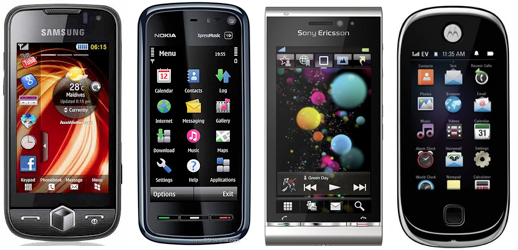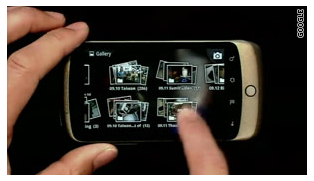Last Friday Sony-Ericsson announced its 2009 results: losses of $1.24 billion with a drop of sales of 40% from the previous year. This made me look at other phone manufacturers, like Nokia, Motorola or HTC. The latest data reported by the Finish company are for the quarter ending in September 09: 20% drop in sales form the same quarter in 08 and a quarterly operating loss of €426M. Motorola did not do too well either, with sales for this last quarter down to $5,45 billion, a drop of 27% from the same quarter the previous year; its operating income for the quarter has been positive, but the last twelve months show an accumulated operating loss of $1,98 billion. Some companies earn money in this business, like RIM (Blackberry), Apple, and HTC. Of these, RIM ($2.7billion operating profit in Fiscal 09 with sales of $11billion) is in fact more of a service provider than a hardware designer and manufacturer, and Apple with its iPhone is a mix of a designer, software developer, and most of all, an extremely smart ecosystem manager; since these companies do not report detailed accounting by product line, it is impossible to know the profitability of their hardware business. HTC is the pure hardware manufacturer of this trio, famous for it partnerships, and manufacturer of operator-branded phones since its founding in 1997. HTC has been a leading manufacturer of handsets for US and Japanese carriers and it was not until 2006 that the company sold its first HTC-branded phone. For this past 2009, the company has just released its unaudited numbers: sales of $4.5 billion (a drop of 5.03% from the previous year) with an operating income of $757 million.
These rather dismal results of the industry as a whole might be due to the current economic downturn, to more specific structural issues in the mobile handset market, or both, but there is no doubt that they should make companies think twice before deciding to invest heavily in it. And it is in this context that the January 4th announcement of the launch of the Nexus One by Google is even more interesting.
Why would anybody enter such an industry at this time? The market seems crowded of smart phones (see iPhone look-alikes) 
and one could expect reasonably desperate moves in pricing by the companies that have invested heavily in the design of these devices and need to sell them at any price above their manufacturing costs in order to recover their investment. The entrance of Google in the mobile market has to be analyzed in the context of the overall digital value system. Users, the final payer of this entire ecosystem, are increasing dramatically the time devoted to mobile surfing and will continue to do so when “surfing” will be embedded in the devices we carry with us all the time, not only our phones, but out tablets (book readers?), navigation devices, car radios, and every conceivable electronic instrument that will benefit form being connected to the cloud.
Microsoft has shown the world the importance of the operating system in the devices that thrive from a myriad of specialized developers providing different pieces of the final product that need a “connector”. Windows is the inevitable glue that allows my Dell machine to run my Adobe software. Becoming a proprietary standard in an industry is a gold mine; these are not news, and the players in the mobile space know them. In a world in which users look for usability (the current paradigm of usability being the iPhone) the mobile industry is not technically mature enough to provide great user experiences via independent providers coupled by open standards. The iPhone is a step above anyone else because Apple controls all the relevant steps of the iPhone value chain, from hardware to the OS and the application store. This imposes obvious rigidities, but ensures impeccable Apple style user experience. In this context, it is of no surprise that the integrated platforms grow (Apple and Blackberry) and the competing proprietary open multiple-player platforms lose (Symbian and Windows Mobile).
What is then the role of Google? It is not a secret that the company from Mountain View wants a leading role in the information distribution industry; it plays it in PC-based information distribution, but it could lose it in the mobile space to Apple and perhaps Microsoft. In this context, Google has no choice but to try to make sure that two things do not happen when the market matured: (1) that Apple is the only game in town, and (2) that if a multiple player ecosystem develops, Microsoft owns an important piece of it and captures most of the value provided by the rest of players.
This situation has forced Google to develop Android, an operating system poised to compete head to head with Apple OS in functionality at an unbeatable price for hardware manufacturers: free.
But for Android-based phones to provide an experience close to the iPhone in a short time, and before insurmountable network effects take place and the Apple device is definitively unbeatable, Google needs great hardware perfectly integrated with the capabilities of Android, something that only the companies that control both have been able to obtain: Apple and Blackberry (RIM). Therefore, Google had no choice: build its own phone. And once this decision was made, the partner of choice was HTC; its experience developing devices under other company’s specs, particularly NTT DoCoMo, made it unbeatable. And here is the Nexus One.

Keeping with the company tradition, though, Google cannot operate the same way as Apple does: it sells the Nexus only via de Internet (as it did with its shares in its IPO) and not exclusively with a carrier (as Apple did with ATT). The Nexus role in life is not to become a dominant player as the iPhone tries to be, rather, it is to be an example for other hardware manufacturers of how to integrate with Android, and to provide software and application developers a credible alternative platform to the iTunes store. The next few months will be crucial to see how the market will evolve. In a few weeks, the third player will show its cards: Microsoft will present the next version Windows Mobile (perhaps 7.0) at the Mobile World Congress in Barcelona: good luck trying to collect license fees from the money-losing handset manufacturers. It better be an astonishing piece of software.


